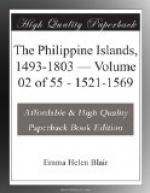is of slight moment, by reason of their inhabitants
being poor and naked,” and their best use is
as a way-station from New Spain; and New Guinea on
the other hand offers much profit in both temporal
and religious matters, that their conquest be permitted
to Legazpi. 21. That, in case of Legazpi’s
death before the conquest is effected, the petitioner,
or Legazpi’s heir and successor, or the person
appointed by him, may complete it. This petition
was vistoed in Madrid, March 2, 1569, although it
had been presented a considerable time before that
date. After waiting for two years in vain for
an answer to this petition Melchor de Legazpi presented
another petition asking: that efficient aid be
sent his father; that he be confirmed in his title
of governor and captain-general “with the salary
that your highness is pleased to assign him, and with
the other rewards contained in his [Legazpi’s]
petition, ... and that he be not abandoned to die
in despair at seeing himself forsaken and forgotten
by his king;” that he be granted the four thousand
ducats promised him by Velasco “in order that
we might better prepare for the marriage of ... my
sister, who is of marriageable age.” The
petition states that even had Legazpi’s expedition
proved a failure, the king should not permit want
to come upon his children, since his substance had
been expended in the royal service. In the third
petition, Melchor de Legazpi requests that the office
of accountant of the City of Mexico rendered vacant
by the death of its incumbent, be bestowed upon him,
in remembrance of his father’s services.
He says the family is “poverty-stricken and in
debt,” because of his father having spent all
his possessions in the king’s service.
The fourth petition presents information concerning
Legazpi’s services. The fifth petition requests
that certain persons be received by the court as witnesses,
and give information regarding Legazpi. From
the testimony of these persons it was shown that Legazpi
was one of the oldest and most honored citizens of
the City of Mexico; that he was a wealthy landholder
of that city; and had lost his wealth through devotion
to the king’s service, without receiving any
reward therefor. (Tomo iii, no. xlvi, pp. 330-370.)
Warrant of the Augustinian Authorities in Mexico Establishing the First Branch of Their Brotherhood in the Philippines—1564
Fray Pedro de Herrera, vicar-general of the Order of Hermits of our holy Father Augustine in the regions of the Indies, with Fray Diego de Vertavillo, provincial of the same order in this Nueva Espana, and Frays Antonio de Aguilar, Nicolas de Perea, Francisco de Villafuerte, and Juan de Medina, definitors [80]—to our very dear Brethren in Christ, Andres de Urdaneta, prior, Diego de Herrera, Andres de Aguirre, Lorenzo de San Esteban, Martin de Rada, priests, and Fray Diego de Torres, to you, all and singular, everlasting greeting in the Lord.




